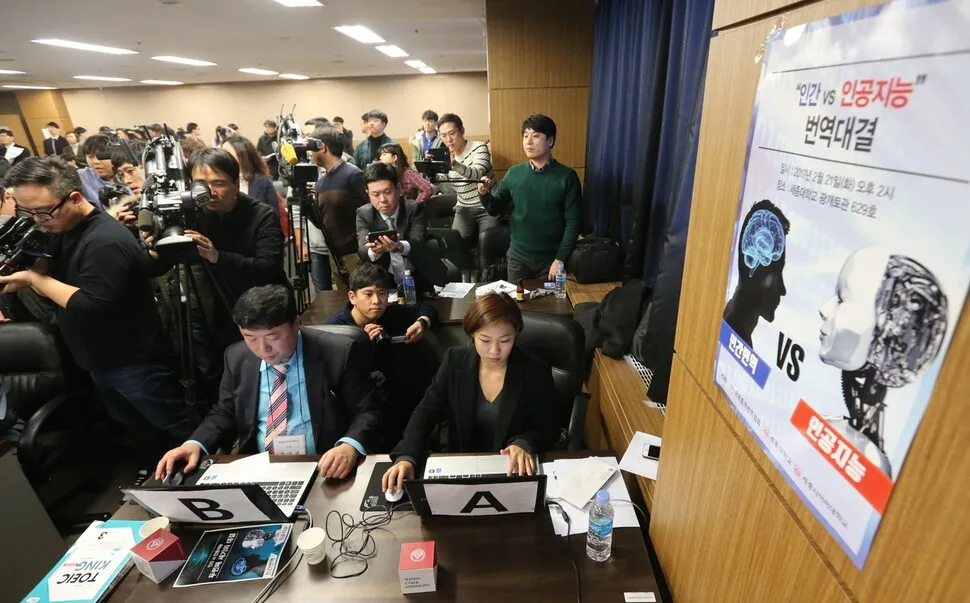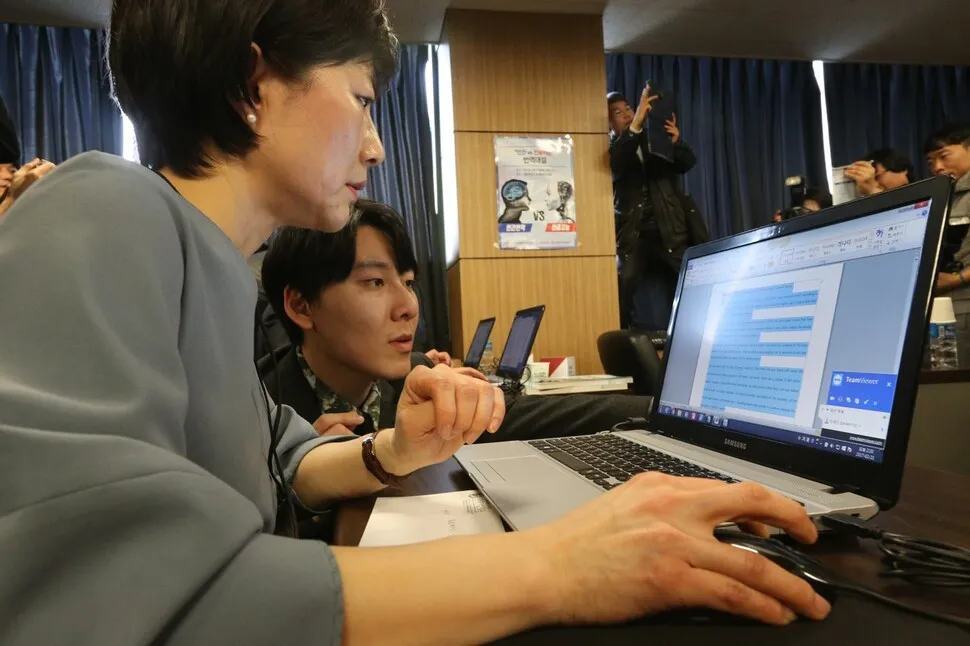hankyoreh
Links to other country sites 다른 나라 사이트 링크
Humans triumph over machines in translation competition

Humans faced off against artificial intelligence programs again - this time in the area of translation.
While the battle ended in a resounding win by the human beings, the victory may be less important than the questions it raises about future human-machine collaborations.
Organized by the International Interpretation and Translation Association (IITA) and Sejong University, the Human vs. Artificial Intelligence Translation Challenge was held on Feb. 21 at Sejong University in Seoul. Dozens of news outlets covered the event, including China Central Television, in what was perhaps a sign that the shock of the AI program AlphaGo’s unexpected victory over Level 9 Go grandmaster Lee Se-dol last year has yet to subside.
For the challenge, four human translators and three AI translation programs tackled the same translation tasks, with scores assigned by a group of three IITA experts, including association chairperson Gwak Jung-cheol, who selected the passages. Representing the human side were professional translators of different genders and ages, ranging from a woman of 30 to a man of 55. On the AI side, translations were performed by Google Translate, Naver’s Papago, and a Systran translation program.
The results showed human translators scoring an average of 24.5 out of 30 points - far ahead of the 10 points averaged by the machine translations. Four categories of assessment were used: literary translation from English to Korean and from Korean to English, and non-literary translation from English to Korean and from Korean to English. The human translators spent 50 minutes while using internet search engines. For the machine translations, the passages were input into widely available online translation services, after which the translations were checked.
Unlike Go, translation is not a game with clear winners and losers, so the victory itself did not hold great meaning.
“Go is a game where it is obvious who won and lost, but with translation you can’t really say there is any objective standard for victory,” said Shin Seok-hwan, vice president of the artificial neural network technology company Saltlux, while attending a round table on AI translation held at the same venue that day.
“It’s significant as a confirmation of the usefulness of machine translation,” he added.

Google and Naver approved the use of their online services by the organizers, but were not otherwise involved in the event.
Some are saying rapid advancements in artificial neural network machine translation mean it is time to consider ways in which humans and machines can coexist.
“There have long been efforts to generate cooperation between humans and machines in the translation field,” said Kim Yu-seok, director of strategy for the machine translation company Systran.
“What is so significant about the emergence of AI translation last year is that it means machines are at a level where they can collaborate with humans. The task that lies ahead concerns how to efficiently generate a [translation] work stream [divided between humans and machines],” Kim added.
Korea Association of Translation Studies president Hur Myung-soo said education efforts were being launched to “train translators who know how to use machine translations.”
By Kwon O-sung, staff reporter
Please direct questions or comments to [english@hani.co.kr]

Editorial・opinion
![[Editorial] Abandoned appeal in 2019 lawmaker clash case raises questions about prosecutors’ standards [Editorial] Abandoned appeal in 2019 lawmaker clash case raises questions about prosecutors’ standards](https://flexible.img.hani.co.kr/flexible/normal/500/300/imgdb/original/2025/1128/1817643173126142.jpg) [Editorial] Abandoned appeal in 2019 lawmaker clash case raises questions about prosecutors’ standards
[Editorial] Abandoned appeal in 2019 lawmaker clash case raises questions about prosecutors’ standards![[Column] The origins of China’s real estate bubble [Column] The origins of China’s real estate bubble](https://flexible.img.hani.co.kr/flexible/normal/500/300/imgdb/original/2025/1127/3717642304508069.jpg) [Column] The origins of China’s real estate bubble
[Column] The origins of China’s real estate bubble- [Editorial] Was Yoon’s wife pulling the strings of those investigating her?
- [Column] Has Korean society become any safer since the martial law crisis?
- [Column] Japan’s quandary in the ‘new type of great power relations’
- [Editorial] Yoon proves himself a coward and a fool in court
- [Column] A prospect more worrying than a Korean Peninsula sans US
- [Column] There’s no solving the feud between Japan and China
- [Correspondent’s column] Goodbye MAGA, hello affordability?
- [Editorial] PPP lawmakers get slap on the wrist for violent violation of legislative procedure
Most viewed articles
- 1What’s really driving the drastic depreciation of Korea’s won
- 2Korean industries reeling on surging won-dollar exchange rate
- 3Korea sinks further into trade deficit with China amid inaction from government
- 4Won’s real effective exchange rate plummets to lowest level since 2009 financial crisis
- 5[Column] Russia and China’s golden ticket to destabilizing the dollar
- 685% of major Korean firms say political uncertainty could fuel exchange rate woes
- 7S. Korea, China renew their currency swap for additional five years to an increased US$59 billion
- 8Korea records first trade deficit with China since 1992
- 9Value of Korean won down 7.3% in 2024, a steeper plunge than during 2008 crisis
- 10[News analysis] The double-sided nature of South Korea’s growing diplomatic influence